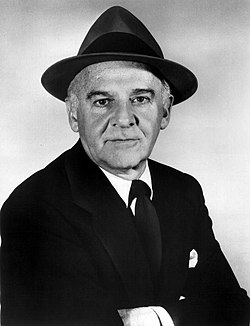Walter Winchell Quote
Related Quotes
This is a day of celebration!Today, we are divorcing the pastand marrying the present.Dance,and you will find Godin every room.Today, we are divorcing resentmentand marrying forgiveness.Sing,and God w...
Kamand Kojouri
Tags:
accept, acceptance, apathy, beloved, bitter, bitterness, celebrate, celebrating, celebration, ceremony
They took one look at me,And hated my black face.They took one look at me,And decided on my fate.They took one look at me,And forced an unknown fear.They took one look at me,And caused the shed of tea...
N'Zuri Za Austin
Tags:
acknowledge, all lives matter, black lives matter, bleed, bleeding, blood, conflict, erase, faith, harmony
About Walter Winchell
Walter Winchell (April 7, 1897 – February 20, 1972) was a syndicated American newspaper gossip columnist and radio news commentator. Originally a vaudeville performer, Winchell began his newspaper career as a Broadway reporter, critic and columnist for New York tabloids. He rose to national celebrity in the 1930s with Hearst newspaper chain syndication and a popular radio program. He was known for an innovative style of gossipy staccato news briefs, jokes, and Jazz Age slang. Biographer Neal Gabler said that his popularity and influence "turned journalism into a form of entertainment".
He uncovered both hard news and embarrassing stories about famous people by exploiting his exceptionally wide circle of contacts, first in the entertainment world and the Prohibition era underworld, then in law enforcement and politics. He was known for trading gossip, sometimes in return for his silence. His outspoken style made him both feared and admired. Novels and movies were based on his wisecracking gossip columnist persona, as early as the play and film Blessed Event in 1932. As World War II approached in the 1930s, he attacked the appeasers of Nazism, then in the 1950s aligned with Joseph McCarthy in his campaign against communists. He damaged the reputation of Josephine Baker as well as others who had earned his enmity.
He returned to television in 1959 as the narrator of the 1930s-set crime drama series The Untouchables. Over the years he appeared in more than two dozen films and television productions as an actor, sometimes playing himself.
He uncovered both hard news and embarrassing stories about famous people by exploiting his exceptionally wide circle of contacts, first in the entertainment world and the Prohibition era underworld, then in law enforcement and politics. He was known for trading gossip, sometimes in return for his silence. His outspoken style made him both feared and admired. Novels and movies were based on his wisecracking gossip columnist persona, as early as the play and film Blessed Event in 1932. As World War II approached in the 1930s, he attacked the appeasers of Nazism, then in the 1950s aligned with Joseph McCarthy in his campaign against communists. He damaged the reputation of Josephine Baker as well as others who had earned his enmity.
He returned to television in 1959 as the narrator of the 1930s-set crime drama series The Untouchables. Over the years he appeared in more than two dozen films and television productions as an actor, sometimes playing himself.
